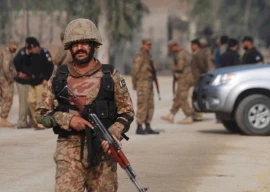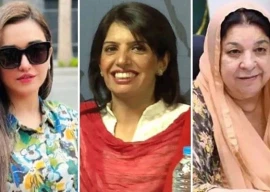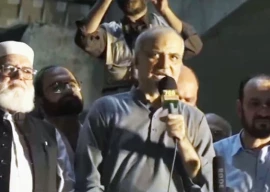Speaking on the occassion of Zulfikar Ali Bhutto’s 31st death anniversary, the president said that the first two years of the PPP-led government had been spent “strengthening democracy and institutions.” A day prior to this, Prime Minister Yusuf Raza Gilani had also said pretty much the same thing — and one would wholeheartedly agree with the assessment of both these men.
The 18th amendment, when passed, would be arguably one of the most important amendments to the Constitution of 1973 in that it would hopefully make parliament and its leader – the prime minister – the main source of authority and power.
It will do away with the infamous Article 58 (2)(b) which has been used by military dictators in the past to dissolve parliament, and also put in place a mechanism for appointing judges to the Supreme Court in a manner that will hopefully avoid the kind of confrontation that happened not too long ago between the judiciary and the executive.
As for strengthening institutions and the federation, there can really be no debate on that, given that one of the key actions will end up in the elimination of the concurrent list, which has been a long-standing demand of the smaller provinces.
That alone, to some extent, will go some way towards strengthening the federation and will allow the provinces greater control over affairs of governance and state that should have been in any case been theirs to look after.
Having said this, an impartial look at the performance of the PPP-led government would suggest that the president as well as the prime minister have a lot to do in the months ahead and cannot afford to rest on the laurel of pushing through this historic piece of legislation.
For instance, while the constitution does quite clearly mention that the president has immunity from prosecution in a court of law during the time that he is president, the issue has cropped up because of the deal that Mr Zardari and his late wife brokered with General Pervez Musharraf vis-à-vis the infamous National Reconciliation Ordinance.
And this would not have been necessary had the president not had several criminal cases registered against him for alleged acts of corruption committed when Benazir Bhutto was prime minister.
In that context, it would be fair to say that to a great extent Mr Zardari’s image/ reputation has not improved over time and allegations of corruption, nepotism and favouritism have plagued this government. Perhaps the passage of the proposed 18th amendment will help in setting things right for the president in that once implemented it will end up curtailing the powers of the president and make his position a figurehead symbol — as mandated/envisaged in the 1973 Constitution.
So for him to acquiesce – and gracefully at that – in what to some may seem as the emasculation of the presidency can only mean that perhaps Mr Zardari has matured as far as politics are concerned.
Before concluding we would like to raise one particular – and quite important – point with reference to the planned constitutional changes. This relates to the constitutional provision which requires that the head of state be a Muslim – an outcome when the words ‘Islamic Republic of’ were added to the country’s name. This requirement is patently unfair and discriminatory towards the millions of non-Muslims who are citizens of this country, and who by the constitution’s own provisions are entitled to equal protection and treatment in the eyes of the law.
It would be good for the nation if this particular contradiction was also addressed and resolved as a result of the 18th amendment.


















COMMENTS (1)
Comments are moderated and generally will be posted if they are on-topic and not abusive.
For more information, please see our Comments FAQ